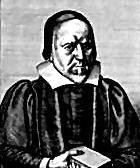

So here is another blog of mine that I want to draw attention to. We started with the Thomas Adams one here. My other blog devoted to a Puritan is here. It looks at forgotten early puritan Richard Bernard [1568-1641].
A Puritan lived name of Bernard
A preacher he was, very learned.
He also wrote much
On pi'ty and such
But now by most people he's spurn-ed.
A preacher he was, very learned.
He also wrote much
On pi'ty and such
But now by most people he's spurn-ed.
I came across Bernard studying Puritan writings on the conscience. Some posts here began life here on this blog but then I transferred them over.
This prolific Puritan pastor and writer was author of The Faithfull Shepheard and his practice (1607, 1621), a handbook for ministers and an allegory called The Isle of Man (1627). I started the website in January 2007 and it now contains some 69 posts, not quite as many as I had hoped by this time. It has officially had around 1,274 visits (an average of 7 a day) and 2,443 page views (an average of 11 a day). It's not doing quite as well as Adams then but that is to be expected.
Quote:
The Father of his mercy gave him for us, and he in love bestowed himself of us. The Father did will our peace, and he spared no pains. He came into the world poor, to make us rich. He was to the wicked a derision, that we with angels might be had in admiration. He was blasphemed, to make us blessed; buffeted and scorned, to make us secure in true comfort. He worked righteousness, that we might be free of wickedness. He was innocent, to procure us pardon, being penitent. His holiness is our happiness, his suffering our safety, his grace our good. He was here in trouble for us, his life painful and miserable, so his end for us doleful, and his torments intolerable. In all his life, that we read of, he did never laugh, but often lament. He mourned to see men’s madness, and wept for their woe. Here he sighed for to make us sing. He sobbed and sorrowed much to make us merry. He bore upon him unutterable torment patiently, that we might avoid the plagues of God eternally. His prayers were loud cries and strong, to make our prayers to pierce the heavens.

2 comments:
Could I ask what the allegory "Isle of Man" was about? I've never heard of it before (my ignorance, I think!).
Sorry, mann, nothing about the island only about man himself as theologically analysed by Bernard. The joke's quite an old one then!
Post a Comment